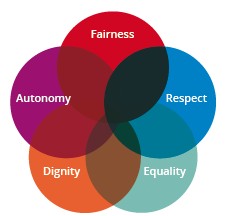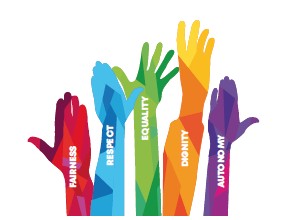Chapter 46 – Grainne Ridge (D3SOP6)
Domain 3 Standard of Proficiency 6
Be able to demonstrate an evidence-informed approach to professional decision-making, adapting practice to the needs of the service user and draw on appropriate knowledge and skills in order to make professional judgements.
|
KEY TERMS Evidence-based approach Professional decision-making Freda principles
|
Social care is … a holistic approach to supporting people through care, advocacy, empowerment, innovation and personal development. |
Evidence-based Approach
The role of a social care worker is wide and varied. A social care worker provides care and support, guidance, direction and education to people who are experiencing challenges at a particular time in their lives and/or who may be defined as vulnerable by society. Social care workers go the extra mile to really make a difference in the lives of the people they support and empower them to live fuller, enjoyable and independent lives. Social Care Ireland describes the core principles of social care work as ‘respect for the dignity of clients; social justice; and empowerment of clients to achieve their full potential’ (Social Care Ireland 2009). Social care workers make professional decisions that can impact on the lives of others, so taking time to consider how professional decisions are made is important.
In recent years, there has been a practice shift from a needs-based approach to a human rights-based approach (HRBA), with the development of the United Nations Convention on the Rights of Persons with Disabilities (2007) and the Assisted Decision-Making (Capacity) Act 2015. Chapter 64 explains the human rights based approach in detail, and should be read in conjunction with this chapter. The Health Information and Quality Authority (HIQA) text Guidance on a Human Rights-based Approach in Health and Social Care Services provides an evidenced-based framework to guide social care workers through the process of decision-making (HIQA 2019). This will provide a structure for this chapter and act as a guide and evidence-informed approach to professional decision-making,
Professional Decision-making
Social care workers’ professional decision-making and practice is guided by policies, procedures, integrated knowledge and the relationship they have with a service user and his/her family. Decisions affecting the service user’s life are made in the person’s best interest, taking time to support the service user to communicate their wants and needs. It is the role of the social care worker to ensure that their views, choices or opinions are taken into consideration; however, this can be can be difficult at times, especially if the service user’s capacity to make a decision is in question. The FREDA principles framework will help ensure that the service user’s consent is present in all professional decisions made.
The FREDA principles

The following case study, from my master’s in healthcare management (2012), is used here as an example on how to apply the FREDA principles to practice as an evidenced-informed approach to professional decision-making in social care practice.
Case Study 1
Mary is a social care worker in a residential care facility for adults with autism. She has worked there for 17 years and is part of a diverse staff team with different cultural backgrounds and practice experiences. The service users have autism and are non-verbal and she knows all of them very well. Mary described the service users as ‘nearly like family’ and said that she truly loved and enjoyed her work. As part of the interview, I discussed the daily running of the residential area and how the service users were involved in their home and the service delivery within it. She spoke so passionately about service users and her colleagues and the work that they did there. I asked about menu planning, grocery shopping and meal preparation. She proudly explained that the service users didn’t need to worry about any of that, as it was all done for them. She described how the staff planned and compiled the dinners for the week, the staff were very efficient and went alone to the supermarket and did the grocery shopping, the staff prepared and cooked all the meals and all the service users had to do was to come to the table when it was ready, it was luxury, nearly hotel-type service. When I asked about the service users’ involvement in the process, she laughed and said, ‘Oh God no, sure they have challenging behaviour, they wouldn’t be able for any of that.’ I then asked about their likes and dislikes food-wise, she replied again that the service users were non-verbal and had challenging behaviour, they wouldn’t be able to tell them what they liked and they didn’t and there had been ‘no complaints’ about the food or cooking, so it was all fine.
The following discussion follows the five FREDA principles of fairness, respect, equity, dignity and autonomy and how this approach may help Mary include the service user’s will and preferences in some of the activities in the house, including decisions made on the weekly menu.
Fairness ‘means ensuring that when a decision is made with a person using a service about their care and support, that the person is at the centre of the decision-making process’ (HIQA 2019: 14). Although Mary stated that the services users were non-verbal, there are many ways to include people in the decisions made in the house.
Respect ‘is central to providing person-centred care and support. People who use services must be listened to, and what is important to them must be viewed as important to the service. The principle of respect must be upheld regardless of a person’s impairment or loss of capacity’
(HIQA 2019: 25). According to the FREDA principles, if a person cannot communicate their opinions and tastes, you can ask family members and another person nominated to be their advocate. Asking family or friends what a service user likes to eat when at home can expand the selection of meals that are served in the residential home.
Equality relates to equity and treating everyone the same regardless of ethnicity or ability. Within the FREDA principles, equality also includes respectful communication, where workers ensure ‘that each person is provided with information in a format and medium that is tailored to their needs and preferences regardless of who they are or their communication ability’ (HIQA 2019: 34).
Dignity is treating the service user in a compassionate way, making sure that they are treated like a human being, with rights and self-respect. Social care workers can uphold the dignity of the service user by ‘enquiring about a person’s preferred lifestyle, including routines, pets, personal care, clothing preferences, religious and cultural preferences, and facilitate their lifestyle as much as possible. This can be something as simple as providing preferred food options during mealtimes’ (HIQA 2019: 41).
Autonomy relates to the service users having a say in their own life experiences and the decisions that are made on their behalf. To ensure that the service user has autonomy it is important to engage in meaningful communication on an ongoing basis and ‘recognise that a person’s wishes to engage may change over time and where a person chooses not to engage, regularly review their interest to re-engage’ (HIQA 2019: 50). Just because the service users did not communicate a desire for meal-making in the past does not mean that this is true at this moment Workers need to constantly check in with service users to see if they would like to engage.

Consider this …
- How would you feel if you didn’t have a voice in your daily life? If you were never asked what you wanted to wear? If clothes were just picked out of your wardrobe and put on you
- What if you were never asked what you wanted to eat? If meals were just put in front of you whether you liked it or not?
- What if you were never asked where you’d like to go or what you’d like to do on your days off? If the day was pre-planned without you, where you went and what you did already laid out, how would you feel?
These may be all minor choices on the face of it, but we make hundreds of decisions every day, many decisions we make without ever thinking about them. How would you feel if that continued for weeks, months or even years?
Decision-making in Practice
In 2019, a residential care facility sought a High Court order to prohibit a man with Down Syndrome marrying his partner, who also had an intellectual disability (Healy 2019). It was claimed that under the Marriage of Lunatics Act 1811 the man did not have the ability or capacity to make a decision about getting married to his partner of 15 years. The man was subject to a wardship application by his family. Under the Lunacy Regulation Act 1871, a person can be found to be incapable of managing their financial and personal affairs or property. A wardship order ultimately takes away the rights of the person in relation to their medical and financial decisions. A ward of court cannot marry, make a will or travel outside the jurisdiction without the consent of the court (Inclusion Ireland 2018).
The man took a constitutional challenge against the two Acts. Four consultant psychiatrists and two psychologists argued in court that he lacked capacity to manage his own affairs or make life decisions such as marriage. The man was due to inherit a substantial amount of money and his family opposed the marriage. His partner, although she also had an intellectual disability, was viewed as being ‘higher functioning’ and her capacity was not questioned in the case, and her mother was in support of her marriage (Carolan 2020). While the case was being processed, the court ordered for their wedding to be cancelled rather than it going ahead and them being annulled if the ruling went against them (Healy 2019).
Articles 9, 22 and 23 of the UN Convention on the Rights of Persons with Disabilities (UNCRPD) relates to a person’s right to respect for their private and family life, their relationships, their physical and mental wellbeing, and access to their own personal information. It also relates to a person being supported to communicate and have active participation in their communities (UN 2007).
TASK 1
Apply the FREDA principles to this example and discuss how you as a socialcare worker could support the man in the case.
Consider this …
- How would you feel if other people made decisions about your life without taking into consideration your views, your choices, your will and preference?
- How would you feel if your family, your doctor and even doctors you’ve never met made decisions about your medical treatment and how you spent your money?
- How would you feel if your decision about who you wanted to marry was questioned? If your private life was discussed in court and reported in the national newspapers?
As social care workers, it is our responsibility to support the will and preference of the people in our care. We must advocate for their rights and their preferences, but that does not mean that we have to agree with all their choices. As with any of us, the people we support have the right to make a decision that we may think is unwise or goes against medical or other advice. Once the person is fully informed and all the options, eventualities and outcomes of their decision are communicated to them fully, in a format that is accessible to them, we as social care workers must uphold the person’s autonomy to make that decision. The Assisted Decision-Making (Capacity) Act (2015) argues that you must always assume that the service user has the capacity to make their own decisions. A person is only deemed ‘to lack capacity to make a decision if they are unable to understand the information relevant to the decision, retain that information long enough to make a voluntary choice, use or weigh that information as part of the process of making the decision and communicate his or her decision in whatever way they communicate’ (HIQA 2019: 49).
The development of advance healthcare directives is a move towards people with capacity being able to plan for their future. The advance healthcare directive (AHD) is legally binding and details the person’s wishes directly concerning specific treatment decisions in the context of an anticipated deterioration in their condition near their end of life. The AHD is in place in the event that the person has a loss of decision making ability to give consent to or refuse treatment and communicate them to others (Irish Hospice Foundation 2016).
Appropriate and positive risk-taking is essential when ensuring that a person’s autonomy is promoted in a safe, supportive environment. The assessment of risk of the decision must be made with all available professional information, advice and evidence, as well as the person’s own will and preference (HIQA 2016). Social care workers cannot become risk-averse in supporting vulnerable people with the decisions that they make; even if the decision is deemed to be unwise, we must assume capacity and provide support (HIQA 2019).
Ultimately, we need to leave our own personal preferences and biases aside and do the right thing for the people we support in the course of our work. Self-reflection can be used by social care professionals to enable them to consider and strike a balance with the competing ethical principles of respecting people’s human rights, autonomy and ‘do no harm’. This can help promote autonomy and safety for the social care worker and the people we support (HIQA 2016).
![]() Tips for Practice Educators
Tips for Practice Educators
- Read Chapter 67 by Noelle Reilly and Denise Lyons and use the SKIP Model (Lyons & Reilly) categories of knowledge-informed practice to guide your discussion.
- Write a new case study based on a fictional service user, ask the student to apply the FREDA principles to the dilemma and discuss.
- Share how you make decisions with your service user, what evidence do you rely on to make decisions. Talk about situations that worked well and the evidence you used to make that decision.
References
Carolan, M. (2020) ‘Intellectually disabled man challenges marriage ban and court wardship’, Irish Times, 28 January.
Government of Ireland (2015) Assisted Decision-making (Capacity) Act. Dublin: Irish Statute Book.
Healy, T. (2019) ‘High Court blocks marriage of man with intellectual disabilities’, Irish Independent, 20 June.
HIQA (Health Information and Quality Authority) (2016) Supporting People’s Autonomy: A Guidance Document. Dublin: HIQA.
(2019) Guidance on a Human Rights-based Approach in Health and Social Care Services. Dublin: HIQA.
HSE (Health Service Executive) (2017) Assisted Decision-making (Capacity) Act Complaint Officer Workshop. Dublin: HSE.
Inclusion Ireland (2018) Capacity. Dublin: Inclusion Ireland.
Irish Hospice Foundation (2016) Advance Care Planning and Healthcare Directives for a Person with Dementia. Dublin: Irish Hospice Foundation.
Law Reform Commission (2006) Vulnerable Adults and the Law. Dublin: LRC.
NSW (New South Wales) Government (2009) Capacity Toolkit. Sydney: Attorney General’s Department, NSW. SAGE, HSE and Nursing Homes Ireland (2015) Empowerment Briefing Document. Dublin: Third Age.
Social Care Ireland (2009) What is Social Care Work? [online]. Available at <www.socialcareireland.ie> [accessed 27 January 2020]. UN (United Nations) (2007) Convention on the Rights of Persons with Disabilities. New York: UN General Assembly.

